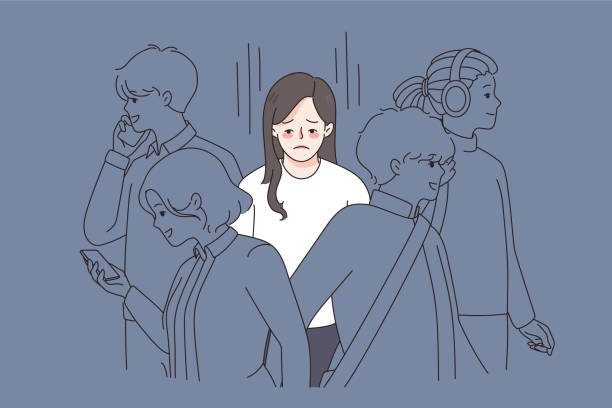'' I will be unable to speak ''
'' I look abnormal ''
'' I am boring ''
'' They think I am stupid ''
'' They don't like me ''
Here are typical thoughts of a person suffering from social anxiety (or social phobia). The person depreciates himself or herself and is very concerned about the judgment of others.
We can define social anxiety as a fear of situations in which the person is observed by others. The person fears being humiliated or embarrassed by the way they act or by their symptoms of anxiety such as blushing or shaking. Even if the person knows that his or her fear is excessive or irrational, he or she dreads most social situations, which he or she tries to avoid or tolerates with difficulty.
Social anxiety, which belongs to the large family of anxiety disorders, affects about 7% of the population.
In this article, we will look at how to measure social anxiety, the risk factors and the symptoms of this disorder, the main fears of the social phobics and the repercussions in the life of a person. Next, we will discuss how to fight social anxiety. To do this, we will pay attention to the treatments and the Montreal organizations helping this population.
How to measure social anxiety ?
Social anxiety can be measured using the Liebowitz Social Phobia Scale, which is at the disposal of doctors and psychologists. It allows to validate objectively the diagnosis of social phobia and to assess the intensity of social anxiety presented by the patient. Social anxiety can also be measured with the Wells’ (1997) Social Phobia Rating Scale.
Risk factors
Social anxiety does not have a clearly identified cause. A combination of biological, hereditary and environmental factors leads to the appearance of the disorder.
On a biological level, studies highlight the presence of disturbances in cortisol (stress hormone) levels in social phobics. Other research has focused on the disruption of neurotransmitters in this population. There would be a hyperfunctioning of the noradrenergic system and hypoactvity of the dopaminergic system.
On a hereditary level, although there is no gene that has clearly been identified, studies put highlight a family risk. If one of the family members suffers from social anxiety, chances are that another family member will be affected by this disorder, rather than in a family where no one is affected.
On an environmental level, studies show that social phobics often come from families where there is little interaction with the outside world. In their childhood, they were overprotected by their parents that would not have encouraged them to get in touch with others.
We often also find significant events related to exposure to others that may have precipitated the onset of the disorder. If, by example, a person has experienced bullying or has been ridiculed in front of a group, they may have difficulty speaking in public afterwards.

People at risk
Social anxiety equally affects men and women. It has been found that people with social phobia often have other psychological disorders such as: another anxiety disorder, a depression, excessive consumption of substances with anxiolytic properties such as alcohol, etc.
Symptoms: how does this fear manifest itself ?
The people who experience social anxiety experience anxiety as soon as they are in the presence of what scares them or as soon as they plan to deal with it.
Social anxiety often comes with one or more of the following symptoms: rapid heart rate, tightening of the chest, fast breathing, dry mouth and throat, tremors, excessive sweating, muscle aches, stomach aches, diarrhea or abdominal discomfort, blushing, confusion. The person has then the tendency to focus his or her attention on these manifestations, which amplifies them and as a result increases the anxiety. Social anxiety can also be accompanied by feelings of embarrassment and even of shame.

Social phobics pay close attention to the behaviours of others and always interpret them negatively. They get the impression that the others reject them or criticize them. They often have low self-esteem of themselves and many negative thoughts such as I suck, I am not going to make it.
The main fears of social phobics
The main fears and situations feared by social phobics are: 1- fear of speaking in public; 2- fear of blushing in public; 3- fear of participating in meetings; 4- fear of performance situations (exams, tests, etc.); 5- fear of being teased; 6- fear of phoning unfamiliar people; 7- fear of having a conversation; 8-fear of meeting unknown people; 9-fear of being observed; 10-fear of performing in front of people.

Impact on the person's life
Social phobia is thus similar to an extreme and pathological shyness having significant repercussions on the social, family and professional life of the people who suffer from it. On the social level, social anxiety can limit leisure activities or cause difficulty in having romantic relations. On the professional level, this can result in having difficulty attending meetings or interacting with colleagues. Without a doubt, social phobia causes great suffering and negatively impacts the quality of life.
How to fight social anxiety: treatments
Social anxiety is a disorder that can be treated and there is recognized treatments. The treatments allow people that have social anxiety to regain control of their lives and daily activities. The earlier the person consults, the better their chances of recovery.
In the majority of cases, social anxiety can be effectively treated with psychotherapy, psychological education in group, medication or by a combination of these treatments.
Psychotherapy
Experts in anxiety disorders generally recommend cognitive behavioral therapy. This psychotherapy aims to modify problematic thoughts, beliefs and behaviours of the person and replace them by thoughts and reactions which are appropriate to reality.
Assertiveness therapy
Assertiveness therapy aims to help the person interact more effectively with others. It is very useful and effective in fighting social anxiety. The goal of the therapy is to get people to express their opinions and feelings without anxiety. It often takes place in groups and role plays are part of the tools used to put the people in situations close to real situations.

Medication
Different medications can also be used to treat social anxiety, including antidepressants and anxiolytics.
Complementary approaches
Relaxation can be effective in fighting the anxiety that accompanies social phobia. The purpose of relaxation is to achieve muscle relaxation and good breathing.

On the other hand, many studies have shown that hypnosis is effective in reducing the anxiety that accompanies phobias.
Montreal organizations helping social phobics
Two Montreal organizations help people with social anxiety: Phobies zéro and Relief.
Phobies zéro allows people that suffer from anxiety disorders to benefit from the support to which they are entitled and through which they can, little by little, live a life free of irrational fears. This non-profit organization offers self-help groups and self-management workshops for anxiety disorders. It also offers a telephone helpline.
Relief offers several services to help to live with anxiety, depression or bipolar disorder. The chosen approach is the self-management support. Relief also offers support groups animated by mental health professional.
Conclusion
All in all, the person who has social anxiety dreads most social situations, which they try to avoid or tolerate with difficulty. He or she feels that others reject or criticize him or her. A combination of biological, hereditary and environmental factors leads to the appearance of the disorder. Social anxiety is a source of great suffering for those affected and it diminishes their quality of life.
Finally, several treatments can reduce social anxiety: cognitive behavioral therapy, assertiveness therapy, medication, relaxation and hypnosis. Finally, in Montreal, Phobies zéro and Relief offer support groups and self-management workshops for anxiety disorders.

Merci Prunelle pour cet éclairage tellement utile.
Le relaie à ma compagne au travail dans équipe de soutien d’intensité variable (SIV) et qui rencontre ces défis avec des personnes tous les jours!